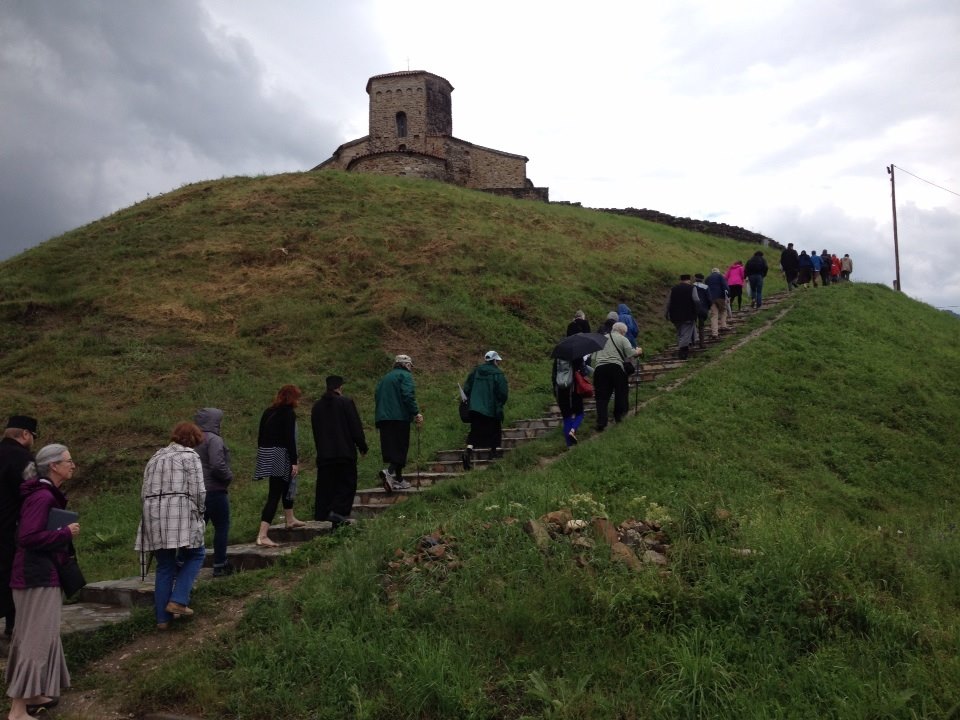Monday of the 3rd Week of Luke
Listen to an audio podcast of this post at https://www.spreaker.com/episode/pilgrims-and-strangers-on-the-earth-monday-of-the-third-week-of-luke–62372892
In today’s Gospel, the Lord turns worldly reasoning upside down, and He commands His followers to do that which is above nature:
The Lord said to the Jews which came to Him: woe unto you that are rich! for ye have received your consolation. Woe unto you that are full! for ye shall hunger. Woe unto you that laugh now! for ye shall mourn and weep. Woe unto you, when all men shall speak well of you! for so did their fathers to the false prophets. But I say unto you which hear, Love your enemies, do good to them which hate you, Bless them that curse you, and pray for them which despitefully use you. And unto him that smiteth thee on the one cheek offer also the other; and him that taketh away thy cloke forbid not to take thy coat also. – Luke 6: 24-30
St. Theophan the Recluse, in his commentary on these verses, points out that Our Lord is painting a picture of the entire Christian life as a time of exile and pilgrimage, not security and rest:
Woe to those who are rich, who are full, who laugh, and who are praised. But good shall come to those who endure every wrongful accusation, beating, robbery, or imposed hardship. This is completely opposite to what people usually think and feel! The thoughts of God are as far from human thoughts as heaven is from the earth. How else could it be? We are in exile, and it is not remarkable for those in exile to be offended and insulted. We are under a penance, and the penance consists of deprivations and labors. We are sick, and bitter medicines are most useful for the sick. The Savior Himself did not have a place to lay His head for His whole life, and He finished His life on the Cross. Why should His followers have a better lot? The spirit of Christ is the spirit of preparedness to suffer and good-naturedly bear all that is sorrowful. Comfort, conceit, splendor, and ease are all foreign to its strivings and tastes. Its path lies in the fruitless, cheerless desert. Its model is the forty-year wandering of the Israelites in the desert. Who follows this path? Anyone who sees Canaan beyond the desert, overflowing with milk and honey. During his wandering he too receives manna – however, not from the earth, but from heaven; not bodily, but spiritually. All glory is within. – Thoughts for Each Day of the Year, pp. 219-220
We all agree with the truth of this of course, but if we are honest, we admit that we do not feel the truth of it. Think about it: When is the last time we rejoiced in spirit because someone hated us, cursed us, abused us, physically assaulted us, or stole from us?
How do we do this – rejoice in hardship, love our enemies, and so forth? How do we follow the divine charter for Christian living as found in the Sermon on the Mount in St. Matthew and the Sermon on the Plain in St. Luke, from which we read today? Here is a short to-do list:
One: Admit that we cannot live the Gospel. Admit that to the end of our lives we will fail. As St. Ignatius Brianchaninov says in The Arena, even the greatest saints fall short of the Gospel. It is beyond the power of human nature; it is “above nature,” as the Fathers say. We should not give in to the temptation from the right side, to be made despondent by the false accusation that we are hypocrites, an accusation usually made by someone who wants to use our weakness as an excuse to deny the truth of our Faith. When a sincere, repenting Christian fails to live up to the Gospel, this is not hypocrisy; a hypocrite is someone who habitually pretends before others to be the opposite of what he really is, not someone with high standards who tries hard but falls short. Even if we are striving, we shall still fall, at least in small ways. Grace comes always if we ask for God’s help to get up again. And remember: salvation, much less Christian perfection, is the free gift of grace.
Two: So we must pray daily with all our hearts that God forgive us for not living the Gospel, that He give us the grace to live it better, and that He give us the grace daily to admit our failure and to ask for more grace.
Three: Force ourselves to thank God when bad things happen.
Four: Pray for those who harm us, both the great and the small, but especially the small, that is, the person right in front of us.
Remember, as St. Theophan points out, that we are exiles and pilgrims in this life. We are on a journey going to our true home, and we should expect discomfort. The warm fire, fuzzy slippers, and comfy armchair are at the end of the journey, not on the road. All of our problems arise from delusions, and all of our delusions start with the idea that we are little gods creating a nice little world here in this life. But our true home is in the heavens; our life is hid with Christ in God. This life is an arena, a contest, a struggle, and a trial. Our Judge awaits us, with the crown of life in His hand for those who do not give up.
It is always later than we think. Death is always at the door. This is indeed a sobering thought, but, if we live in repentance, it is also a thought that conveys ineffable consolation. The Lord is near.

